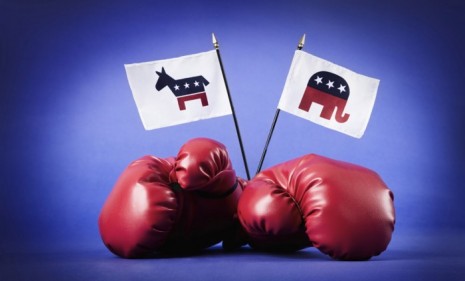Left-wing or just over-educated?
A new study says that college graduates are less able to acknowledge their conservative tendencies than high-school drop outs. What's behind the delusion?

A new study out of England's University of Leicester has found that well-educated people often consider themselves more liberal than they truly are. Dr James Rockey, the political economics lecturer who led the research, concluded that college graduates were less able to recognize their own conservative tendencies than those who had left school at 16. Here's a concise guide to his findings:
How was the study conducted?
Rockey's data is based on surveys of 136,000 people in 48 countries, conducted between 1981 and 2008. Respondents were asked to rate themselves on a ten-point scale, with 1 being "left-wing" and 10 being "right-wing." The results were then compared with the subjects' responses to specific questions about their politics (for instance, how they think a country's collective wealth should be distributed), reports The Guardian, "to determine how closely the participants' own perception matched their real position on the ideological spectrum."
The Week
Escape your echo chamber. Get the facts behind the news, plus analysis from multiple perspectives.

Sign up for The Week's Free Newsletters
From our morning news briefing to a weekly Good News Newsletter, get the best of The Week delivered directly to your inbox.
From our morning news briefing to a weekly Good News Newsletter, get the best of The Week delivered directly to your inbox.
What exactly did the study find?
College graduates typically perceived themselves to be more liberal than their responses to Rockey's questions would suggest. Those whose formal education ended at 16 were arguably more self-aware when it came to accurately assessing their ideological leanings.
Why does Rockey think this happened?
He postulates two explanations: First, "that people compare themselves not to the population as a whole but to the people they know; and second, that real political preferences (as opposed to one's political self-image) "change over time." Someone who marched for left-wing causes in the 60s might still identify as a liberal, even if his current political views are quite conservative.
A free daily email with the biggest news stories of the day – and the best features from TheWeek.com
What are the limitations of the study?
Since it surveyed individuals from 48 countries, it doesn't specifically reflect the U.S. electorate's definitions of liberal and conservative. Hot Air's Allahpundit says that U.S. voters "are verrrrry reluctant to describe themselves as 'liberal.'" Only 22 percent applied that term to themselves in a 2008 survey, though election results show that a much larger percentage voted Democrat. But a larger problem is that words like "liberal" are highly subjective: Clearly, says Allahpundit, "political labels aren’t a pure function of policy choices but carry all sorts of cultural and emotional baggage with them."
Sources: The Guardian, Hot Air
-
 Political cartoons for February 1
Political cartoons for February 1Cartoons Sunday's political cartoons include Tom Homan's offer, the Fox News filter, and more
-
 Will SpaceX, OpenAI and Anthropic make 2026 the year of mega tech listings?
Will SpaceX, OpenAI and Anthropic make 2026 the year of mega tech listings?In Depth SpaceX float may come as soon as this year, and would be the largest IPO in history
-
 Reforming the House of Lords
Reforming the House of LordsThe Explainer Keir Starmer’s government regards reform of the House of Lords as ‘long overdue and essential’
-
 The billionaires’ wealth tax: a catastrophe for California?
The billionaires’ wealth tax: a catastrophe for California?Talking Point Peter Thiel and Larry Page preparing to change state residency
-
 Bari Weiss’ ‘60 Minutes’ scandal is about more than one report
Bari Weiss’ ‘60 Minutes’ scandal is about more than one reportIN THE SPOTLIGHT By blocking an approved segment on a controversial prison holding US deportees in El Salvador, the editor-in-chief of CBS News has become the main story
-
 Has Zohran Mamdani shown the Democrats how to win again?
Has Zohran Mamdani shown the Democrats how to win again?Today’s Big Question New York City mayoral election touted as victory for left-wing populists but moderate centrist wins elsewhere present more complex path for Democratic Party
-
 Millions turn out for anti-Trump ‘No Kings’ rallies
Millions turn out for anti-Trump ‘No Kings’ ralliesSpeed Read An estimated 7 million people participated, 2 million more than at the first ‘No Kings’ protest in June
-
 Ghislaine Maxwell: angling for a Trump pardon
Ghislaine Maxwell: angling for a Trump pardonTalking Point Convicted sex trafficker's testimony could shed new light on president's links to Jeffrey Epstein
-
 The last words and final moments of 40 presidents
The last words and final moments of 40 presidentsThe Explainer Some are eloquent quotes worthy of the holders of the highest office in the nation, and others... aren't
-
 The JFK files: the truth at last?
The JFK files: the truth at last?In The Spotlight More than 64,000 previously classified documents relating the 1963 assassination of John F. Kennedy have been released by the Trump administration
-
 'Seriously, not literally': how should the world take Donald Trump?
'Seriously, not literally': how should the world take Donald Trump?Today's big question White House rhetoric and reality look likely to become increasingly blurred